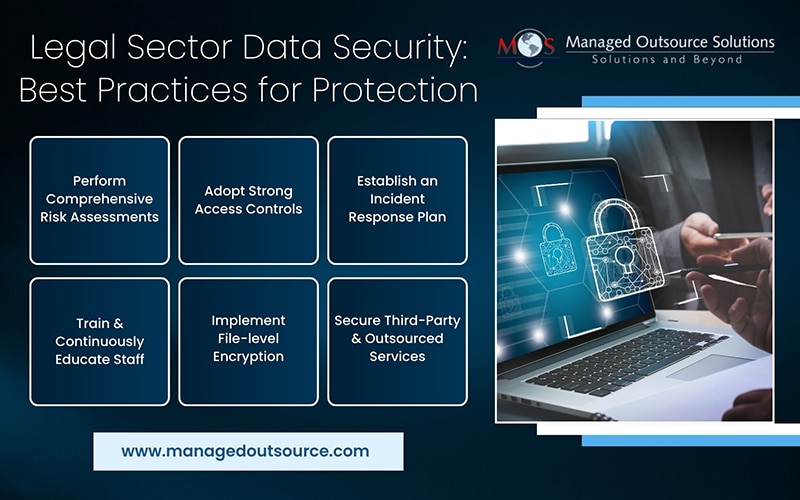Law firms and legal service providers handle an immense amount of highly confidential client information. From sensitive financial data to intellectual property records, litigation documents, and personal client details, the legal sector has become a prime target for cybercriminals. Unfortunately, many firms don’t properly understand the importance of data security in the legal industry, leaving themselves vulnerable to costly breaches, regulatory penalties, and reputational damage.
The risk of data breach is rising for the legal industry. According to a recent survey by Arctic Wolf and Above the Law, 39 percent of respondents reported that their firm experienced a security breach in the last year. Additionally, among those who experienced a security breach, 56 percent lost confidential client data – one of the worst outcomes for a law firm.
For legal professionals, maintaining confidentiality is not only an ethical obligation but also a critical factor in building and sustaining client trust. However, with the increasing sophistication of cyber-attacks, ensuring data protection has become a complex challenge. This post explores the common cybersecurity threats faced by law firms and best practices for protecting sensitive legal data in an evolving digital landscape.
Why Data Security Is Critical in the Legal Sector
The legal profession thrives on confidentiality. Attorneys and legal professionals are entrusted with private client communications, case strategies, and business-critical information. Any compromise in this trust can have significant consequences. The impact of data breaches on law firm reputation is profound as clients may lose faith in the firm’s ability to safeguard their interests. Regulatory bodies may impose penalties, and opposing parties could exploit leaked information.
Strengthen your law firm’s defenses with expert strategies to safeguard sensitive client data and maintain trust!
Top Data Security Challenges for Law Firms
The legal industry has always been a trusted custodian of sensitive information, but that very responsibility now makes law firms prime targets for cyber-attacks. Here are some top data security challenges for law firms:
-
- Increasing Cyber-attacks Targeting Legal Data: Law firms have become attractive targets for cybercriminals due to the high value of the information they manage. Hackers often seek client trade secrets, intellectual property, or merger and acquisition details that could provide financial gain. The common cyber security threats faced by law firms include:
- Phishing attacks aimed at gaining access to email accounts.
- Ransomware that locks files until a ransom is paid.
- Malware and spyware designed to track keystrokes or steal documents.
- Insider threats, whether intentional or accidental.
- Increasing Cyber-attacks Targeting Legal Data: Law firms have become attractive targets for cybercriminals due to the high value of the information they manage. Hackers often seek client trade secrets, intellectual property, or merger and acquisition details that could provide financial gain. The common cyber security threats faced by law firms include:
Without proactive defense measures, law firms risk exposing confidential case files, contracts, or settlement negotiations.
- Remote Work and Cloud Security Risks: The shift to hybrid and remote working environments has expanded the threat landscape for law firms. Lawyers often access case files and client data from home networks, mobile devices, or shared cloud storage platforms. While cloud technology offers convenience, it also introduces vulnerabilities if not properly secured. Implementing encrypted file-sharing systems and secure collaboration platforms is essential to ensure that protecting sensitive legal data remains a priority, even outside the office.
- Compliance with Data Protection Regulations: The legal industry must comply with various data privacy regulations such as GDPR, HIPAA (for healthcare-related cases), and state-specific privacy laws. Non-compliance brings the risk of financial penalties and can also jeopardize client relationships. Legal industry data protection requires firms to stay informed about evolving regulatory requirements and implement compliance-driven security frameworks. This includes conducting regular audits, updating privacy policies, and ensuring secure storage of client records.
- Insider Threats and Human Error: One of the most important risks in law firm cyber security comes from within. Employees or contractors with access to sensitive client files can unintentionally expose data through mishandling or deliberately misuse their access for personal gain. This is where legal data entry services play an important role. Outsourcing routine but sensitive tasks like data entry to trusted, secure service providers reduces the risk of human error. This helps law firms maintain accuracy, efficiency, and confidentiality.
- Outdated Technology and Weak Security Practices: Many small and mid-sized law firms still rely on outdated IT systems, legacy software, or weak password protocols. Cybercriminals exploit these weaknesses to infiltrate networks. Basic cyber security hygiene such as multi-factor authentication, regular software updates, and penetration testing are essential first steps in strengthening data security in the legal industry.
How to Strengthen Data Security in the Legal Sector
With cyber threats on the rise and highly sensitive client information at stake, legal organizations must prioritize data privacy and security as an ongoing commitment. Here are a few ways in which law firms can begin investing in a robust data protection strategy:
- Perform Comprehensive Risk Assessments: An effective assessment will include evaluating the types of data your organization processes, the systems it uses, and the potential points of entry for unauthorized users. Regular monitoring and audits will help keep these assessments updated.
- Adopt Strong Access Controls: Access controls are critical to prevent unauthorized access to sensitive data. Strict password policies, multi-factor authentication (MFA), and other measures should be in place for both employees and third-party vendors.
- Establish an Incident Response Plan: The right plan can help guide a law firm’s actions in the event of a data breach or security incident. As part of these incident response plans, legal organizations should assign roles and responsibilities, establish notification protocols, and develop processes to minimize the impact of a breach, cyber-attack, disaster, or other disruption.
- Train and Educate Staff: Human error is considered one of the leading causes of data breaches. Educating attorneys and staff on phishing scams, password hygiene, and secure data handling reduces risks from human error. Regular training sessions can help educate everyone about data security best practices, including identifying phishing emails, avoiding suspicious websites, and following rules for compliance.
- Implement File-level Encryption: Data encryption is a fundamental practice to protect sensitive information, including under-protected, unstructured data. It will help avoid the pitfalls of legacy software, which can introduce significant performance drawbacks and require difficult-to-manage endpoint agents. Encrypting files, emails, and case management systems ensures that even if data is intercepted, it cannot be read without authorization.
- Secure Outsourcing – Leveraging legal data entry services from reputable providers with robust security certifications minimizes risk while improving efficiency. By entrusting critical tasks to specialized experts, law firms can focus more on core legal work while ensuring compliance with strict data protection standards. This approach not only safeguards sensitive information but also drives long-term operational resilience.
The legal industry is facing an unprecedented wave of cyber security challenges. As digital transformation accelerates, law firms possess highly sensitive client data and, therefore, are prime targets for cyber threats. By acknowledging the common cyber security threats faced by law firms, addressing insider risks, and leveraging solutions like secure legal data entry services, firms can enhance their defenses. Ultimately, the impact of data breaches on law firm reputation cannot be overstated. Clients expect the highest level of confidentiality and protection when it comes to data.
By prioritizing data security in the legal industry and investing in robust protection measures, law firms can not only safeguard their clients but also strengthen their own credibility and long-term success.





